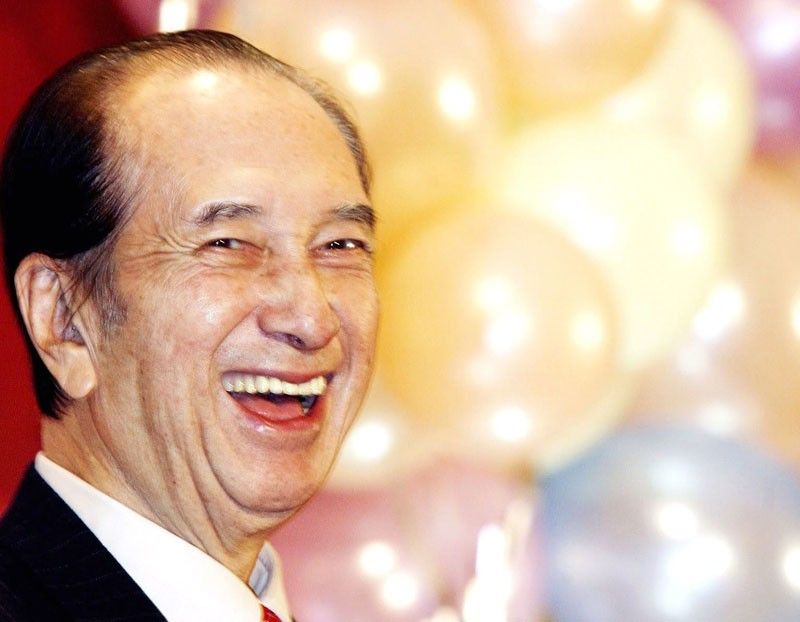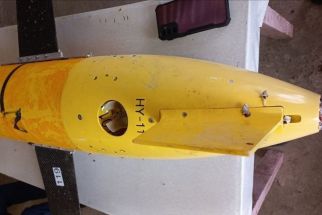Stanley Ho, Macau gambling king, 98

HONG KONG – Stanley Ho, the Hong Kong-born tycoon who made billions transforming neighboring Macau from a sleepy Portuguese outpost into the world’s biggest gambling hub, died yesterday at the age of 98, his family said.
Known as the “godfather” of Macau’s casinos, Ho was instrumental in turning the semi-autonomous city on China’s southern coastline into a gambling boomtown.
He fathered at least 17 children and speculation about how his vast fortune would be divided among his offspring has long occupied Hong Kong’s tabloid media alongside public family feuds.
Family members said Ho passed away shortly after 1 p.m. local time in hospital.
“My father will live in our family members’ hearts forever, and the hearts of all the people who benefited from him and were encouraged by him,” daughter Pansy told reporters.
China’s state-run CCTV described Ho as a “patriotic entrepreneur.”
Ho monopolized the gaming industry until 2002, when the government introduced foreign investors, sparking a boom which saw casino takings contribute around 80 percent of Macau’s annual revenue and overtake Las Vegas.
His Sociedade de Jogos de Macao Holdings (SJM) empire remains a major player in Macau, the only place in China where casinos are allowed.
The company took a hit alongside its competitors after China’s President Xi Jinping launched a high-profile corruption crackdown in 2014, triggering a dramatic decline in high-rollers to Macau.
Gaming revenues bounced back until earlier this year when the coronavirus pandemic emptied casino floors and hammered the industry.
Most operators, however, including SJM, have ample cash reserves built up from the boom years to weather a prolonged downturn.
While many of Hong Kong’s tycoons have rags to riches backstories, Ho initially had a gilded start to life.
He was the great-nephew of one of Asia’s first tycoons, Robert Hotung, an influential Eurasian businessman and philanthropist who was among Hong Kong’s wealthiest individuals at the turn of the 20th century.
Smuggling, casinos and children
But Ho’s family fortunes collapsed during the depression years, and when World War II came he fled to Macau virtually destitute.
The war allowed him to make his first fortune – smuggling luxury goods into China from Macau – before securing the only gaming license in the then-Portuguese colony in 1962.
Ho said he had never wagered a bet, even while his casinos continued to rake in billions in revenues annually. He also added to his wealth through a property and shipping empire.
A flamboyant entrepreneur, philanthropist and keen ballroom dancer, Ho first married in 1942 but subsequently had three other partners with whom he had children.
Local media said it was unclear whether or not he had married all the women he called his “wives.”
Bloomberg estimates his family empire is worth $14.9 billion and a spat between rival factions in 2011 became front page news before it ended with an agreement.
Like many of Hong Kong’s magnates, Ho was reluctant to retire and only officially stepped down from SJM in 2018 at the age of 96, handing over the reins to his daughter Daisy and Angela Leong, his fourth “wife.”
One of his sons, Lawrence, runs rival casino and hotel operator Melco International in Macau.
In 2015 his nephew Alan Ho spent 14 months in jail on charges linked to a prostitution racket that was uncovered at the company’s flagship Hotel Lisboa.
Ho had been keeping a low profile after a serious fall in 2009 at the age of 87 which left him requiring brain surgery.
Pansy Ho runs conglomerate Shun Tak, which includes ferry services between Macau, Hong Kong and mainland China and is a major property developer in Macau.
Pansy was named Hong Kong’s richest woman by Bloomberg in 2018.
Earlier this year Ho’s youngest son, 25-year-old Mario, shelled out HK$500 million ($64.4 million) on a house at one of Hong Kong’s most prestigious addresses, the South China Morning Post reported.
Hong Kong boasts one of the highest concentrations of billionaires in the world, but the city is also shot through with inequality, fuelled by a lack of housing, sky-high rents and low wages for blue-collar jobs.
Manila escapade
Ho’s death brought back memories of how his multibillion-dollar gambling empire once reached Philippine shores – first during the time of the late strongman Ferdinand Marcos and again during the time of deposed president Joseph Estrada.
The richest tycoon in Macau, Ho was no stranger to the Philippines. He used to operate casinos in the country during the Marcos years but had to leave after the People Power Revolution in 1986 that toppled the late dictator.
In 1977, The Manila Bay Casino, the first casino of the Philippine Amusement and Gaming Corp. (Pagcor), opened as a floating luxury casino. It operated in all three decks of luxury liner MS Philippine Tourist in partnership with the Philippine Casino Operators Corp. (PCOC) and Manila Bay Enterprises Inc. (MBEI) which was majority owned by Ho’s SJM, according to earlier news reports.
During the short-lived Estrada administration in 1998, Ho tried to make a comeback to revive his floating casino. Known for his deep connections with people in power and even criminal syndicates, Ho reportedly tried to set up his floating casino in Manila again with the help of an unnamed ambassador who had strong links to Malacañang.
The hulking and glittering floating casino and restaurant, which could seat 2,000 customers, docked at the Manila Bay near the Cultural Center of the Philippines and was a spectacle of lights at night – until authorities shut it down soon after it opened.
Business circles at the time also linked him to BW Resources, a gaming firm controlled by Estrada pal Dante Tan. Ho became chairman of the controversial company, which later found itself at the center of a stock market manipulation scandal in 1999.
When the scandal broke out and implicated high profile individuals in government reaching all the way to Estrada himself, Ho hurriedly left the country and became visible again in Manila in 2004 when he was seen with officials of the government, this time the Arroyo administration, according to a 2005 report by The STAR.
He stopped pushing his luck in the Philippines after the failed revival of his floating casino but his ties to Manila remain. His son Lawrence is chairman of Melco Resorts that is behind the City of Dreams Manila with its local partner, Sy-owned Belle Corp. Iris Gonzales
- Latest
- Trending































